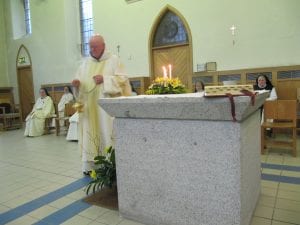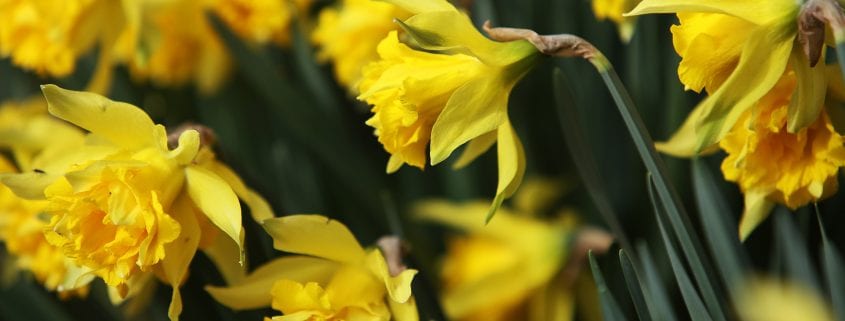Mass Homily for Feast of St Patrick
This year St Patrick’s Day is overshadowed by great concern and uncertainty because of Coronavirus, Covid-19. It is not a time to be mushy or sentimental about our Irishness or even about St. Patrick .Many of us are anxious, even frightened about what lies ahead for ourselves and our families and friends in the coming weeks and possibly months. Oftentimes there is nothing like a crisis to bring us to our senses. We can be so thick that we may even require a second or third crisis to really wake us up. I speak from personal experience.
What can we as contemplative religious do at this time? Most people who know us and come to us really do appreciate the part we play in the church as men and women of prayer; they presume that we are close to God even though we ourselves might not share that view or have that experience of proximity to or intimacy with God. Nevertheless thatdf is what people perceive. Whatever about our feelings, we believe that God is close to us at all times.
St. Patrick had a view of himself when he wrote the following in his Confessio: “I am imperfect in many ways.” Looking back on his youth he writes that “we had turned away from God and had not kept his commandments.” He goes on to say, ‘I did not believe in the living God…I remained in death and unbelief.’ If we stopped to ponder this I wonder how many of us would find ourselves in that position. Have we edged God out to the margins? It was the experience of captivity and its attendant privations that opened Patrick’s mind to God. He says that in the land of his captivity he was seized by an awareness of God’s presence.
As a captive slave in Ireland Patrick found himself in dire straits. He was homesick and miserable, a wretched slave, forced to herd animals on a cold mountainside in Antrim. His situation gave him plenty of time to ponder; he had time to look and contemplate the world of nature, and somehow it was there on the mountainside that he had his in depth encounter with a loving and personal God. At some point during this enslavement or captivity he had it would seem a powerful experience of God so much so that things could never be the same again, as he writes: ‘In the dark before the dawn, I would wake up and pray, even in the snow and frost and rain. No harm came to me … for my spirit was always fervent’. St Patrick tells us that as a frightened young man enslaved in Ireland he prayed hundreds of times in the day and the night for God’s protection. He writes: “Here the Lord opened my mind to repent my unbelief, so that, even at this late stage I might turn with all my heart to the Lord my God, who … pitied my youth and ignorance. And he watched over me before I knew him …and he protected me, and consoled me as a father would his son.”
Sometime after he escaped from captivity and had made his way home again he had a dream in which he felt the call of Jesus Christ (like Peter, Andrew and the others) to commit himself to sharing Christ’s vision of life with others. He too became a fisher of men, and women, among the people of Ireland. As he admits in his Confessions, he did it very successfully, to his own amazement. For despite calling himself a sinner, without learning, a stone lying in the mud, the God of mercy “raised up that stone, and set it on the very top of the wall.” Patrick could easily apply to himself the words of Amos: The Lord said to me, ‘Go, prophesy to my people Israel.’
In Ireland we have a strong tradition that God is at our side in time of trouble. Whether it is making the sign of the cross or saying the Rosary or a prayer to the angel guardian, wearing a miraculous medal or scapular, or carrying a crucifix in our pockets – or simply repeating one of our many, many breastplate prayers, it’s important to remind ourselves in the coming days that we are never completely self isolated: Christ is beside us, before us, behind us, on our right and on our left, beneath us and above us.
I noticed that bishops in their various letters in regard to Covid-19 concluded their letters by quoting from St.Patrick’s Breasplate in which St Patrick invoked the power of the Trinity – the three in one, and one in three; He prayed: “I arise and bind unto myself today Christ’s baptism, death, resurrection, ascension and return on the last day”. It echoes the words of St Paul in Chapter 6 of his letter to the Ephesians where he writes: “Put on the whole armour of God, that you may be able to stand against the wiles of the devil. Stand therefore, having girded your loins with truth, and having put on the breastplate of righteousness, and having shod your feet with the gospel of peace. Take the shield of faith, the helmet of salvation, and the sword of the Spirit”.
What I am saying is that we could surround ourselves with the breastplate of St. Patrick but not only around ourselves but also around our country and the world. Write it out and say it daily or many times daily and envisage it surrounding you like a kind of aura of protection.
Christ with me, Christ before me/ Christ behind me, Christ within me/ Christ beneath me, Christ above me./ Christ at my right, Christ at my left./ Christ in the heart of everyone who speaks to me,/ Christ in every eye that sees me,/ Christ in every ear that hears me.
Our contribution at this time has to be prayer. The coming weeks and perhaps months are going to bring challenges and uncertainty for all of us. We are being reminded of the fragility of human life and of our dependence on one another and on God. We pray for patience and perseverance; we pray for composure to overcome any temptation to despair. We do our best to remain calm and not panic. Let the fruits of the Spirit be visible in love, joy, peace, patience, kindness, goodness, trustfulness, gentleness and self-control. Since the Spirit is our life let us be directed by the Spirit.
(In preparing this homily I would like to express my appreciation to the Irish bishops for their uplifting letters to their people at this time as well as some homiletic resources including those of Martin Hogan and Desmond Knowles.)
– Dom Augustine McGregor ocso, chaplain of St Mary’s Abbey, Glencairn




